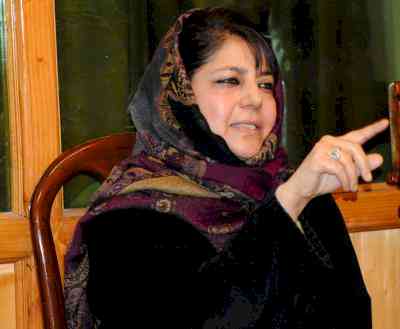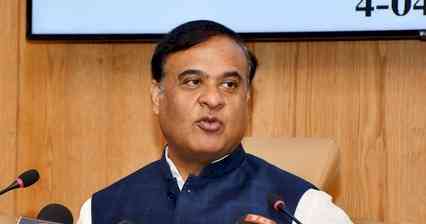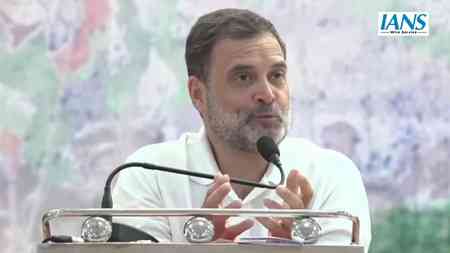J&K: Mehbooba stirs 'Hornet’s Nest', opposes land for poor landless people
The political landscape of Jammu and Kashmir has been marred by controversies and competing narratives for decades. In the latest development, former J&K Chief Minister Mehbooba Mufti has alleged that the government's scheme to allocate 5 marlas of land to landless poor is a ploy to change the demography of the Himalayan region.

Srinagar/New Delhi, July 7 (IANS) The political landscape of Jammu and Kashmir has been marred by controversies and competing narratives for decades. In the latest development, former J&K Chief Minister Mehbooba Mufti has alleged that the government's scheme to allocate 5 marlas of land to landless poor is a ploy to change the demography of the Himalayan region.
No one can deny the fact that after August 5, 2019 -- when the Centre announced its decision to revoke J&K's so-called special status and bifurcate it into two Union Territories -- J&K has witnessed positive changes in terms of peace and development.
The initiatives of the Central government to bring economic and infrastructural development to the region have shown promising results. However, the progress has exasperated the former rulers, who appear to be resistant to accepting the positive transformation and are attempting to discredit the government's efforts.
The government has categorically dismissed Mufti's allegations, asserting that she lacks knowledge about the PMAY scheme and the land laws of Jammu and Kashmir.
It is unfortunate that a former Chief Minister is resorting to divisive rhetoric and talking in a language of late Hurriyat hawk Syed Ali Shah Geelani. This kind of language only serves to further polarise the political discourse in Jammu and Kashmir. Instead of engaging in meaningful dialogue and constructive criticism, such statements undermine the efforts towards peace and prosperity in the region.
No outsider being allotted land
After Mehbooba levelled serious allegations, a spokesman of the J&K government made it explicitly clear that no outsider was being allotted land. The spokesman said that Mufti's statement about the government allotting land to 2 lakh odd persons was factually incorrect.
Furnishing details, the spokesman said that PMAY (Grameen) Phase -1 started on April 1, 2016, in which, 2,57,349 houseless cases were identified in J&K in SECC data 2011 and after due verification by Gram Sabhas, 1,36,152 cases were sanctioned for J&K under the overall commitment of Prime Minister Narendra Modi of ;Housing for all by 2022'.
He said that per unit assistance of 1.30 lakh was provided per house by the Government of India (GoI) under the scheme and the minimum size of the house prescribed was 1 marla.
"The government conducted Awaas+ survey during January 2018 to March 2019 to identify those beneficiaries which claimed to have been left out under the 2011 SECC. The data of beneficiaries captured through Awaas+ was utilised to fill the gaps between overall target and eligible beneficiaries made available from SECC Permanent Wait List (PWL),” the spokesman said.
"PMAY PHASE-II (AWAS Plus) Grameen started from 2019 onwards based on survey of 2018-19, done pan India, in which 2.65 lakh houseless cases were recorded in J&K and only a target of 63,426 houses was given to J&K. These houses have been sanctioned in 2022. This phase of the scheme is getting over on March 31, 2024," he added.
The spokesman said that based on the good performance of J&K in sanction and completion of houses on May 30, 1,99,550 more PMAY Awas+houses have been sanctioned as a special dispensation to ensure housing for all for all 2.65 lakh houseless persons who were part of PWL 2019.
He said the survey was based on clear guidelines on the basis of criteria that includes all houseless; those living in zero, one or two room kachha houses; and multi-layered prioritisation as defined in Section 4 of the scheme guidelines. "Houseless persons who do not have land or clear title of land or have that category of land where construction was not permitted, could not be sanctioned house, even if they were part of this permanent waiting list."
He said the government cannot sanction houses to someone who does not have land, therefore in order to ensure housing for all, the government had taken a policy decision to allot 5 marla land to these 2711 cases so that they could get houses. "These 2711 cases are part of the 2018-19 PWL of houseless persons of J&K, who were debarred from having a house just because either they didn't have land or the land they had was State, Forest, or any other category of land where construction is not permitted. The data being quoted by her (Mufti) is of Housing and Urban Affairs while PMAY (G) scheme is of Ministry of Rural Development for rural areas of J&K," the spokesman added.
Misconceptions addressed
The government's response is not merely a dismissal but an opportunity to provide clarification on the objectives, guidelines, and implementation processes of the scheme. By doing so, the government has addressed misconceptions and ensured transparency in its efforts to uplift the underprivileged sections of society.
By picking up holes in a genuine scheme aimed at helping poor, Mehbooba Mufti has tried to create a stir and mislead the people.
The PMAY was launched in 2016 with the objective of providing affordable housing to all by 2022. The scheme aims to address the housing needs of the urban poor, including economically weaker sections, lower-income groups, and middle-income groups.
Politicians like Mehbooba unhappy
Under the PMAY, eligible beneficiaries receive financial assistance for the construction of small houses. But it appears that politicians like MehboobaMufti are unhappy about the poor being empowered.
Notably, during her tenure as the Chief Minister of Jammu and Kashmir, Mehbooba Mufti did not put in significant efforts to implement the PMAY scheme effectively.
In March 2018, the then J&K Rural Development and Panchayati Raj Minister attended a meeting convened in New Delhi by the Union Minister for Rural Development, Panchayati Raj and Mines, Narendra Singh Tomar to discuss the implementation of PMAY in Jammu and Kashmir.
The then J&K minister had assured full support to implement housing for all schemes but on the ground, but nothing much was done to implement PMAY.
The scheme's success was contingent upon the cooperation and dedication of the then J&K government to ensure its proper execution. But the former regime couldn't spare time for it as the politicians were busy appeasing the separatists and their bosses sitting across the Line of Control (LOC).
Mehbooba's allegations seem to be an attempt to deflect attention from her own administration's failure to prioritize the needs of the underprivileged during her tenure.
Present regime rectifies wrongs
The present dispensation in Jammu and Kashmir led by Lieutenant Governor Manoj Sinha has rectified the wrongs committed by the former rulers by effectively implementing the PMAY. The objective is crystal clear that the benefits of the schemes meant for the poor should reach them.
It is disheartening to witness that the former rulers are annoyed by the progress being made under the new administration. The objective of the PMAY is to uplift marginalized communities and improve their quality of life. This scheme is not a political ploy but a sincere effort to address the housing needs of the people.
By opposing people-friendly schemes like the Pradhan Mantri Awas Yojana Kashmir based politicians are not only hindering the progress and development of Jammu and Kashmir but are also playing into the hands of Pakistan, thereby risking the peace and stability of the region.
By rejecting initiatives aimed at improving the lives of the people, these politicians are potentially fueling unrest and perpetuating a cycle of violence that has plagued the region for decades.
By stirring the 'Hornet’s Nest', a few leaders are depriving their own constituents of an opportunity to secure affordable housing and a better future. Their actions have exposed their true intentions and their willingness to prioritize the welfare of the people they represented for so many years.
Politicians playing into hands of Pak
Moreover, by playing into the hands of Pakistan, these politicians are aligning themselves with forces that have historically sought to disrupt peace and stability in Jammu and Kashmir.
For the past 30-years Pakistan has been sponsoring and supporting cross-border terrorism, which has resulted in the loss of countless lives and caused immense suffering to the people of Jammu and Kashmir. By opposing people-friendly schemes and creating a sense of discontent among the populace, these politicians are contributing to an environment conducive to extremist elements and their disruptive activities.
Despite these politicians making noise, a common man in J&K has recognized that the progress and development are intricately linked to peace and stability in the region. After the scrapping of Article 370, a temporary provision in the Constitution, common people have supported efforts of the government to pave the way for economic growth, social harmony, and a better future for J&K.
Kashmir-based politicians prioritizing their political agendas over the welfare of the people, engaging in divisive rhetoric and obstructing progressive initiatives have unveiled their real face before the common masses.


 IANS
IANS 








